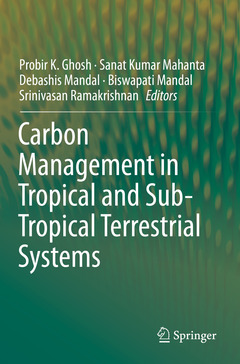Description
Carbon Management in Tropical and Sub-Tropical Terrestrial Systems, 1st ed. 2020
Language: English
Subjects for Carbon Management in Tropical and Sub-Tropical...:
Publication date: 01-2021
438 p. · 15.5x23.5 cm · Paperback
Publication date: 12-2019
438 p. · 15.5x23.5 cm · Hardback
Description
/li>Contents
/li>Biography
/li>Comment
/li>
Soil organic carbon (SOC), a key component of the global carbon (C) pool, plays an important role in C cycling, regulating climate, water supplies and biodiversity, and therefore in providing the ecosystem services that are essential to human well-being. Most agricultural soils in temperate regions have now lost as much as 60% of their SOC, and as much as 75% in tropical regions, due to conversion from natural ecosystems to agricultural uses and mainly due to continuous soil degradation. Sequestering C can help to offset C emissions from fossil fuel combustion and other C-emitting activities, while also enhancing soil quality and long-term agronomic productivity.
However, developing effective policies for creating terrestrial C sinks is a serious challenge in tropical and subtropical soils, due to the high average annual temperatures in these regions. It can be accomplished by implementing improved land management practices that add substantial amounts of biomass to soil, cause minimal soil disturbance, conserve soil and water, improve soil structure, and enhance soil fauna activity. Continuous no-till crop production is arguably the best example.
These soils need technically sound and economically feasible strategies to sustainably enhance their SOC pools. Hence, this book provides comprehensive information on SOC and its management in different land-use systems, with a focus on preserving soils and their ecosystem services. The only book of its kind, it offers a valuable asset for students, researchers, policymakers and other stakeholders involved in the sustainable development and management of natural resources at the global level.
Dr. Probir Kumar Ghosh, Former Director, IGFRI, Jhansi is presently working as National Coordinator, National Agricultural Higher Education Project (World Bank Funded), ICAR, New Delhi, India. He has graduated from Visva Bharati, Shantiniketan, and post-graduated (M.Sc. (Ag) and Ph.D.) from GBP AU&T, Pant Nagar. He is serving in ICAR since last 27 years at various capacities. He has outstanding publication records (267) with 4879 citations, 34 h- index and 73 i10 index. He is a fellow of National Academy of Agriculture Sciences and National Academy of Sciences and 20 National Awards in his credit including MS Randhawa Memorial Award and Vasaantrao Nayak Award.
Dr. S.K. Mahanta, after completion of doctoral studies at ICAR-Indian Veterinary Research Institute, Izatnagar, started his career as Scientist and currently serving as Principal Scientist at ICAR-Indian Grassland and Fodder Research Institute, Jhansi. He has more than 23 yearsof research and extension experience in farm animal nutrition and feeding. He specializes in grazing and pasture management, forage evaluation and development of forage based feeding system for different categories of ruminant animals. He has over 70 research papers of national and international repute and 5 books to his credit. He is recipient of Endeavour Award of Australian Government and Fellow of Range Management Society of India & Animal Nutrition Association of India. At present, he is Editor of Range Management and Agroforestry journal and active member of many scientific societies.
Dr. Debashis Mandal received MSc degree in Soil Science with majors in Soil Chemistry from GBPUA&T, Pantnagar and the PhD degree on Physical Chemistry of Soil from IARI, New Delhi. Debashis currently holds a renowned post of ICAR National Fellow with emphasis on Land Degradation since 2014 at the Faculty of ICAR-IISWC, Dehradun. His research interests comprise asse
These books may interest you

Soils in Natural Landscapes 142.04 €



